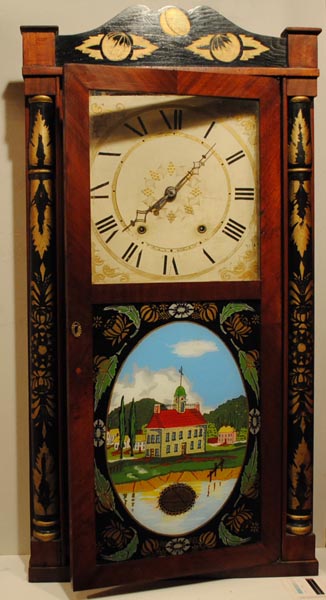
Borders & Frontiers (1800-1820)Colin McKenzie's Clock |
|||
|
|||
A Seth Thomas Clock entered at the Port of Bath |
Trade between Canada and the United States increased steadily after the War of 1812. By 1817, the Village of Bath was a Port of Entry. Situated on Lake Ontario, the village had a good harbour, shipyard and wharfs for loading and unloading vessels. DISCOVER MORE![]()
Acts to regulate the trade between Upper Canada and the United States detailed the duties to be collected at ports of entry on American goods, wares and merchandise imported into the province, as well as on American vessels or boats entering any port. All monies collected at the ports of entry were forwarded to the Receiver General for public uses of the Province of Upper Canada.
Roderick McKay, a British immigrant, was the first customs officer appointed by Lt. Governor Colborne. Following McKay's untimely death by drowning while crossing to Amherst Island in 1818, James Rankin, a former business partner was appointed.
Colin McKenzie followed in 1829. One of the first settlers of Amherst Island, McKenzie had served as a Sergeant in the King's Rangers during the Revolutionary War. He was married to Sarah, daughter of Captain Howard, an officer in the King's Royal Regiment of New York who had settled near Bath when the Regiment disbanded. McKenzie located to the Village of Ernest Town (Bath) where he was active in village life, serving as a Church Warden of St. John's, a Director of the Midland Agricultural Society, President of the Bath Academy and later a Public School Trustee, a Justice of the Peace and Colonel of the Militia.
Among American goods entered at the Port of Bath by Colin McKenzie was a Seth Thomas clock. The interior label reads "Entered at the Port of Bath, Colin McKenzie, Collector". The Seth Thomas Clock Company, founded in Plymouth Connecticut, began producing pillar and scroll clocks as early as 1815.
Following McKenzie's death in November, 1850, there had been speculation that Napanee would be made a Port of Entry and that the vacant collectorship at Bath would not be filled. However, William J. Fairfield, Benjamin's son, was appointed to carry out the duties of Collector of Customs at Bath. By 1865, Fairfield had accepted an appointment as Post Master.
By Confederation, Bath was an outport of Kingston. Bath's significance as a port of entry had declined after mid-century, perhaps reflecting the rise of Napanee as a separate port.
© Lennox & Addington County Museum & Archives
97 Thomas Street East, Napanee, Ontario, Canada K7R 4B9
Funding provided by the Government of Ontario and the County of Lennox & Addington




